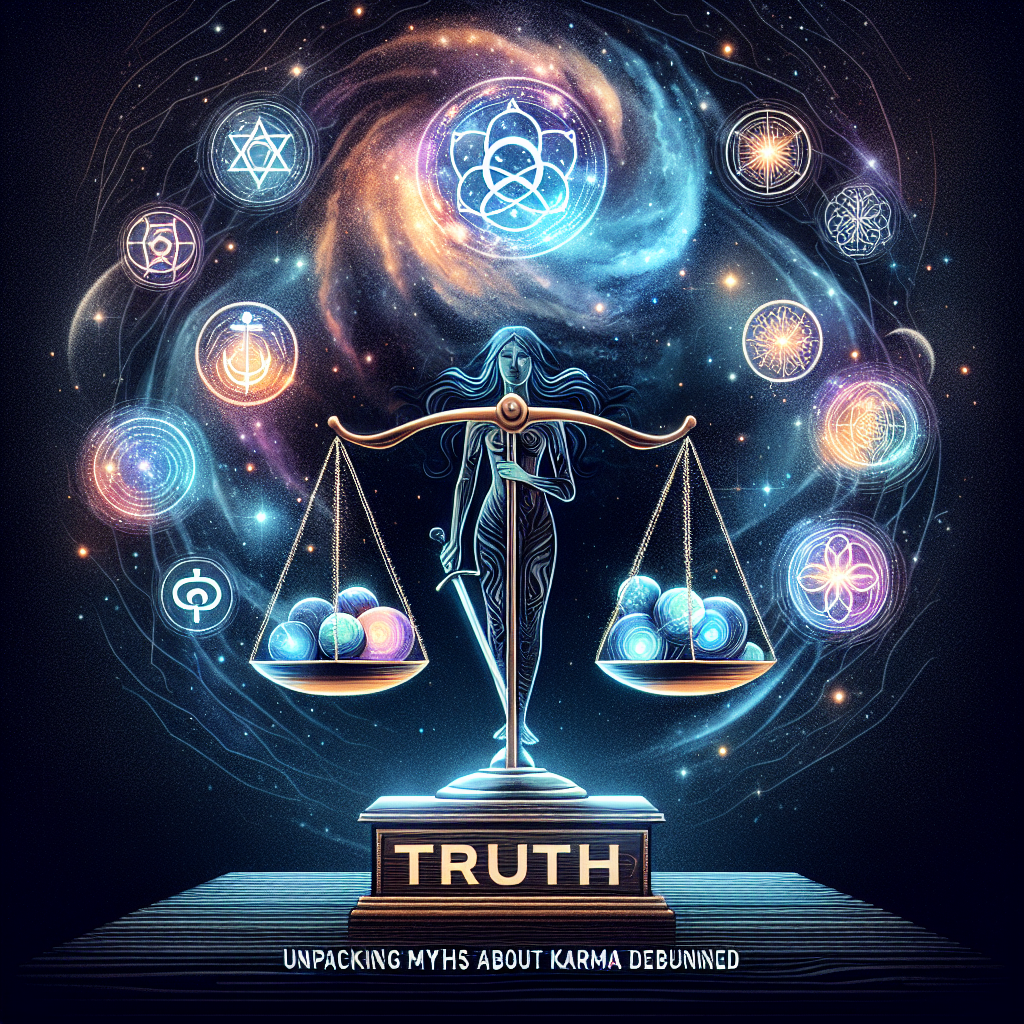Karma is one of the most commonly referenced spiritual concepts in discussions about morality, justice, and the cycle of life. Originating predominantly from Eastern spiritual traditions, it has permeated Western pop culture and led to various interpretations and misconceptions. The fundamental tenet of karma is rooted in the principle of cause and effect, asserting that every action has consequences, either in this life or the next. However, this profound philosophy has been frequently misinterpreted, leading to a slew of common myths that overshadow its true essence. In this article, we aim to unpack these myths, offering a clearer understanding of karma and its implications.
Myth 1: Karma is Just Punishment or Reward
One of the most pervasive misconceptions is that karma functions purely as a system of punishment and reward. Many believe that if one does something bad, they are guaranteed to receive bad things in return, while good deeds will always lead to favorable outcomes. While it’s true that karma involves consequences for actions, it’s essential to understand that these consequences are not necessarily punitive or benevolent in a straightforward manner. Karma encompasses a complex web of experiences shaped by intent, context, and individual circumstances. The real essence of karma is about growth and learning rather than mere recompense.
Myth 2: Karma is Instantaneous
Another prevalent myth is the belief that karma operates on a very short timeline. We often hear phrases like "what goes around, comes around" as if karma has a swift response mechanism ready to deliver justice almost immediately. In reality, karma can unfold over various timelines—across lifetimes, in some beliefs—where actions may not yield immediate consequences. This long-term perspective emphasizes the idea that, while we may not see instant results for our actions, they are still shaping our future experiences.
Myth 3: You Can "Do Good" to Offset Bad Karma
Many people harbor the belief that they can offset their negative actions through a series of “good” deeds, creating a karmic balance. While performing good actions can positively influence future circumstances, the underlying intent behind our actions is crucial. If someone is doing good only to mitigate previous bad deeds, their motivation may not be genuinely altruistic, and thus, may not lead to the desired karmic outcome. Authenticity in intention plays a pivotal role in how karma manifests in our lives.
Myth 4: Karma is Fatalistic
Another misconception is the idea that karma is deterministic and leaves individuals trapped in a cycle of fate, devoid of free will. This fatalistic view implies that past actions irrevocably dictate the present and future, leading to a sense of helplessness. However, karma is better understood as a guide rather than a verdict. While our past actions may establish certain tendencies or patterns, each moment offers the opportunity for growth, change, and the ability to make different choices. We have the power to reshape our karma through conscious decision-making and self-awareness.
Myth 5: Karma Applies Only to Individuals
A common misunderstanding is that karma exclusively operates at an individual level. People often think their actions only affect their own life and experiences. However, karma can also have collective manifestations, as the actions of groups, communities, or nations can yield broader consequences that affect many. Collective karma speaks to shared experiences and responsibilities, illustrating how interconnected we all are in the moral fabric of existence.
Myth 6: Karma is a Moral Law
While many interpret karma as a strict moral code, it is essential to recognize that karma isn’t simply about morality in the conventional sense. Different cultures and spiritual beliefs render different meanings and implications to actions. Karma is not an external enforcement of morality but a natural law that corresponds to the energies we project into the world. It is more about maintaining harmony and balance than adhering to a fixed system of right or wrong.
Myth 7: Karma is an External Judgment
Some view karma as a process managed by an outside force or divine being that actively observes and judges actions. This perspective shifts karma away from being a natural law of cause and effect to a system of celestial accounting. Instead, karma should be seen as an intrinsic part of the universe’s functioning – a response rather than an external adjudication. It reflects a fundamental truth about existence rather than a list of moral dos and don’ts dictated by a higher power.
Myth 8: Experiencing Suffering is Always Bad Karma
Many people mistakenly associate suffering with negative karma. While it’s true that our actions can lead to suffering, it’s crucial to recognize that suffering is also a part of the human experience. Both suffering and joy provide valuable lessons that contribute to personal growth. Negative experiences can lead to profound insights, resilience, and transformation. Therefore, labeling suffering outright as bad karma undermines its potential to foster development and understanding.
Conclusion
Understanding the nuances of karma involves recognizing the greater interconnectedness of our actions and their effects, the role of intention, and the presence of free will in shaping our destinies. By debunking these myths, we can begin to appreciate karma not as a system of punishment or reward, but as a profound and intricate dance of cause and effect that provides opportunities for growth and alignment with our true nature.
FAQs About Karma
Q1: Is karma associated with reincarnation?
A1: Yes, in many Eastern philosophies, karma is related to the cycle of reincarnation. It suggests that the actions of one life can affect experiences in future lives.
Q2: Can I change my karma?
A2: Absolutely! While past actions may shape your present, you have the power to make conscious choices that can positively influence your future and reshape your karma.
Q3: Does karma apply to thoughts as well as actions?
A3: Yes, in many interpretations, thoughts and intentions also play a significant role in karma. Your intentions behind an action can influence the karmic outcomes.
Q4: How can I cultivate positive karma?
A4: Cultivating positive karma involves engaging in compassionate actions, being mindful of your intentions, and making choices that promote kindness, understanding, and growth. Practicing empathy and altruism can have far-reaching karmic effects.
Q5: Is there a difference between karma and dharma?
A5: Yes, karma refers to the consequences of actions, while dharma relates to duty, moral order, and ethical obligations. Both concepts are significant in the broader spiritual framework.
Sure! What kind of prompt are you looking for? Are you interested in a writing prompt, a creative idea, a question to spark discussion, or something else? Let me know, and I’ll be happy to help!, #Unpacking #Truth #Common #Myths #Karma #Debunked, #Unpacking #Truth #Common #Myths #Karma #Debunked, 1736600685, unpacking-the-truth-common-myths-about-karma-debunked





